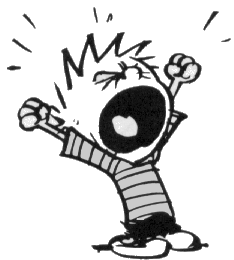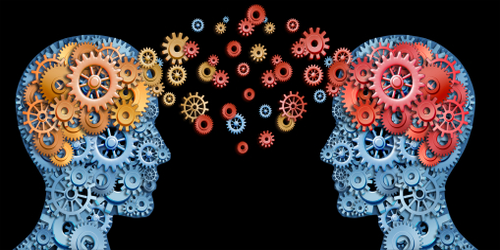It will come as no surprise to the parent of an ASD or ACC child that the typical tool chest for parents of an NT child, for the most part, do not apply. It isn't that these approaches cannot work, they certainly can, but there are aspects to personality and maturity that necessarily must be in place for these common approaches to have any value or benefit.
Having said the above, it is also important to realize that if you have met one child or adult with ACC you have met one child or adult with ACC. What works with one need not necessarily work with another, and visa versa.
One must also understand that "tools" need not necessarily be "methods" or "therapies", but can and importantly do represent knowledge and understanding.
The first and most important thing to realize is that children/adolescents/adults with ACC will and must learn in their own time, not by anyone's schedule, and certainly not using an NT individual as the measuring stick by which to judge them. It should be understood that when someone has ACC we are to expect "their teens, throughout their twenties." The age numbers mentioned are arbitrary, but the principle holds true.
By the time I was 13 years old, I had an above average intelligence, however emotionally I was quite a bit younger than my peers. In my experience, ego development happens differently, at a different rate than NT children. I'll not go into specifics, only because "ego development" is looked at in different ways by different schools of thought...I only wish to stress that the "normal" or average developmental stages look very differently for us.
Again, this is only my personal opinion built of self-observation and observation of other ACCers, but a primary thing "missing" or incomplete in many ACCers is Theory of Mind. ToM (Theory of Mind) is the ability to attribute mental states — beliefs, intents, desires, pretending, knowledge, etc. — to oneself and others and to understand that others have beliefs, desires, intentions, and perspectives that are different from one's own...in short the ability to objectify mental and emotional states, to "step back from them" as it were, and "operate them" as a series of tools. Without sufficient ToM an individual experiences that they actually are their thoughts and emotions...they are too close to them to objectively work with them.
Normally children develop ToM at roughly 3–4 years of age and through a progression of stages starting at around 18 months with the awareness that their own mental states are distinct from those of others. It is found children on the Autism Spectrum as well as Agenesis of the Corpus Callosum do not develop ToM sufficiently, and in some cases not at all.
ToM itself is also on a spectrum, let's call it, from the completely "naive" to actualized, to advanced...Throughout my own life, my own ToM was very weak and underdeveloped. Even though I myself had an above average IQ, read many books on "psychology," my knowledge were more like Legos that I would put together in various ways, to make interesting things, but said knowledge was never applied to me personally in a way that I could use for my benefit.
My own parents and educators and doctors being unaware of ACC, would see me present as very intelligent, I could "speak the words they wanted to hear" but this did not mean I understood them and applied them as personal experience. I went through hundreds (thousands?) of hours of "psychotherapy" that (even in my own eyes) were largely unproductive, useless, and even created more difficulties for me.
I began to experience profound shifts in my own ToM in my late thirties to early forties. The primary tool that I used, and worked with over and over again were mindfulness practices and meditation. I'm aware that many people have concepts of what these things are (usually incorrect ones), yet I've not found one singly more powerful set of tools than these.
Mindfulness, per say is borrowed from the system of Buddhist psychology known as Abhidharma. It need not have any religious or spiritual overtones attached to it. The tools could be considered more a way of being rather than a thing for doing.
The particular set of tools I use(d) are borrowed from the Zen school, and include:
Meditation- (This could look as simple as following and paying attention to ones breathing, their inhale and exhale for one minute, when distraction/thoughts come (and they will) gently return to following the inhalation and exhalation.
Being Awake-We are ACC or not usually distracted in our daily life, in the middle of whatever we are doing we slip into dreams/thoughts/fantasies of the mind, so we practice "coming back to the present moment" of whatever we are involved with, recognizing the tendency to "slip away in thoughts" and recognizing "coming back from the thoughts" to whatever we are currently doing.
Watching Our Urges-ACCers have trouble with executive function and regulation of many things, sleep, food, sex, anger, you name it. Learning how to become aware of when an urge to do something comes upon on, just examining it and not necessarily acting on it, and watching it disappear just as easily and quickly as it arose inside of us.
Watching Our Ideals-Our ideas about how things "should" go, how they should occur. Someone cuts us off in traffic (to give an example) and we think "they SHOULDN'T have done that!!!", but really, who is to say? Are we in their heads, do we know what they were thinking? Perhaps that "SHOULDN'T" is really causing me anxiety and suffering, more than getting cut off in traffic.
Accepting People & Life As They Are-When I stop trying to change a loved one, and accepted them for who they are I am able to just be with them and enjoy my time with them. This acceptance has the same effect for anything we do — accepting our peer, a student, co-worker, another child, but also accepting a “bad” situation, an unpleasant feeling, an annoying sound. When we stop trying to fight the way things are, when we accept what is, we are much more at peace.
Learning to Let Go of Expectations-This is really the same as the previous two tools but it’s useful to watch your expectations with an upcoming situation, with a new project or class, and see that it’s not real and that it’s causing you stress and disappointment. We cause our own pain, and we can relieve it by letting go of the expectations that are causing it. Toss our expectations into the ocean.
Learning to Become OK with Discomfort-The fear of discomfort is huge — it causes people to be stuck in their old bad habits, to not begin new projects or skills, to be stuck doing something they don’t really like, because we tend to stick to the known and comfortable rather than try something unknown and uncomfortable. It’s why many people don’t eat vegetables or exercise, why they eat junk, why they don’t start something new. But we can be OK with discomfort, with practice. ACCers need to start with tiny things, small things, with things that are a little uncomfortable, and keep expanding our comfort zone.
Watch Our Resistance-When we try to do something uncomfortable, or try to give up something we like or are used to, we find resistance. But we can just watch the resistance, and be curious about it. Watch your resistance to things that annoy you — a loud sound that interrupts your concentration, for example. It’s not the sound that’s the problem, it’s your resistance to the sound. The same is true of resistance to food we don’t like, to being too cold or hot, to being hungry. The problem isn't the sensation of the food, cold, heat or hunger — it’s our resistance to them. Watch the resistance, and feel it melt. This is a HUGE one for ACCers.
Learn To Be Curious- We are too stuck in our ways, and think we know how things should be. Instead, learn to be curious. Find out. Experiment. Let go of what you think you know. When you start something new, if we feel the fear of failure, instead of thinking, “Oh no, I’m going to fail” or “Oh no, I don’t know how this will turn out”, try thinking, “Let’s see. Let’s find out.” And then there isn't the fear of failure, but the joy of being curious and finding out. We should learn to be OK with not knowing.
Learn To Be Grateful-We complain about everything. But life is a miracle. Find something to be grateful about in everything you do. Be grateful when you’re doing a new habit, and you’ll stick to it longer. Be grateful when you’re with someone, and you’ll be happier with them. Life is amazing, if you learn to appreciate it.
a very difficult one for ACCers: Learn to Let Go of Control-Often we think we control things, but that’s only an illusion. Our obsession with organization and goals and productivity, for example, are rooted in the illusion that we can control life. But life is uncontrollable, and just when we think we have things under control, something unexpected comes up to disrupt everything. And then we’re frustrated because things didn't go the way we wanted. Instead, practice letting go of control, and learn to let life happen.
Learn To Be Compassionate-This sounds corny, but compassion for others can change the way you feel about the world, on a day-to-day basis. And compassion for yourself is life-changing. These two things need remembering, though, so mindful living is about remembering to be compassionate after you forget.
As you can see, these are things "to be" not things to do...when practiced they can evoke ToM and develop it. Above all, I (personally) think meditation is important...again it need not be anything religiously based, I have practiced the same form of meditation for many years now, and it is not directly related to any religion or way of thinking, in fact can be adapted to any religion or way of thinking...I practice of form of traditional meditation, albeit in a secular fashion, I also have taught it to many people. It is suitable for adolescents over the age of 13 or so, and there are modified versions of it for very young children. The only "requirement" is that the individual not be severely intellectually disabled, as the skill is learned like any skill, and minimally one should be able to follow simple instructions.
The twelve tools mentioned above are sort of a "support" for my practice of meditation...but it was the practice of meditation that is solely responsible for my developing ToM. Having said that, there are times, when my mindfulness (another name for ToM) wanes and I become so identified in my thoughts and emotions I can't separate myself from them, but those days are rare now, whereas they used to be my constant experience.
I hope you have found this information helpful. If you would like me to elaborate on anything or explain it further, please either leave a comment or reach me on Facebook, and I'll do my best to accommodate you.
Thanks for stopping by!
~Joseph
Subscribe to:
Post Comments (Atom)
Meltdown Madness; Sensory Processing Disorder & Cognitive Overload
A requested repost from an earlier date>>>>>>>>> I want to talk about the ACC and ASD phenomenon of meltdowns....

-
A requested repost from an earlier date>>>>>>>>> I want to talk about the ACC and ASD phenomenon of meltdowns....
-
As it turns out, those of us born without a corpus callosum are informing researchers on aspects of autism spectrum disorder. Not all of us...



No comments:
Post a Comment